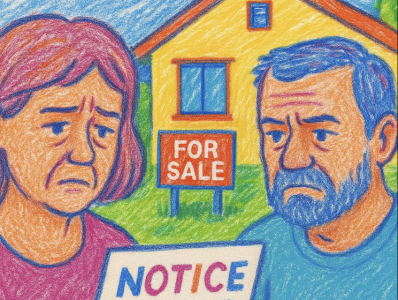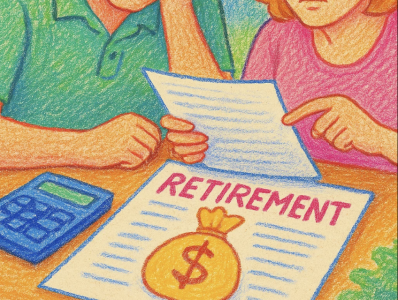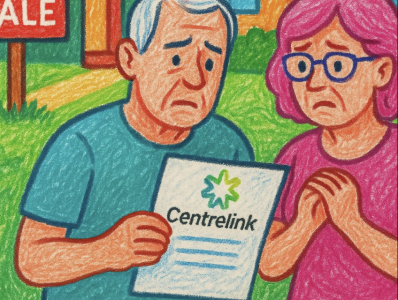Centrelink’s ‘Special Rule’ Warning: Downsizing Could Cost Seniors Their Pension
- Replies 0
Older Aussies love the idea of a simple life in a smaller home – less cleaning, no big yard, maybe some extra cash in the bank. But there’s a fresh warning for seniors thinking of downsizing: a “special” Centrelink rule might just shrink your Age Pension if you’re not careful. In plain terms, selling the family home can trigger a pension trap.
Any profit you pocket from the sale isn’t ignored by Centrelink – in fact, it’s counted as an asset that could reduce your pension entitlements. Suddenly, that hard-earned windfall from years of home ownership can feel like a double-edged sword.
That $300k is no longer tucked safely in an exempt home – it’s out in the open, and Centrelink will factor it in when calculating your Age Pension. Translation: your pension payments could take a hit.
Now, there is a bit of a buffer for people who plan to buy or build a new home. Under a temporary exemption rule, the portion of sale proceeds you intend to use for a new home won’t be counted as assets for up to two years. This gives you time to purchase or construct your next abode without immediately losing pension eligibility.
However, even during this period, those funds aren’t entirely off the radar – Centrelink will “deem” that money to be earning some income (at a low rate) for the purposes of the income test. In other words, they act like you’re getting a bit of interest from that cash, which can still slightly affect your pension payments. And once the two years are up (or if you decide not to get another home), any unspent sale proceeds will officially count as assets and could reduce your pension further.
“It’s a downsizing dilemma,” as one might say – the very act of freeing up money from your home can put your pension in jeopardy. Little wonder Centrelink and financial advisors are waving the caution flag for would-be downsizers.
As Daniel Gannon of the Retirement Living Council noted, the pension asset thresholds haven’t kept up with soaring house values. “Increases in Age Pension assets have failed to take into account the high level of asset wealth many older Australians now hold in their home,” he said, adding that current rules unintentionally discourage “asset rich, cash poor” Aussies from right-sizing into more suitable housing. In other words, the system rewards you for staying put in a big pricey home, and penalises you for downsizing and cashing out some of that equity.
To put the numbers in perspective, a single homeowner can have up to about $314,000 in assets (apart from the home) and still get the full Age Pension. They remain eligible for a part pension until their assets (outside the home) hit roughly $695,000. Those figures might sound high, but consider this: with Australian real estate what it is, a lot of seniors’ homes are worth well above those thresholds.
If a widowed retiree sells a long-time family home and clears, say, $800,000 after buying a smaller unit, that $800k would instantly put them over the pension cut-off – no Age Pension at all in that scenario.
Even couples face the same trap: a couple who own a home and have modest savings could get full pensions, but if they downsize and end up with a few hundred thousand in the bank, they might find their pension payments slashed. It feels like a punishment for doing the prudent thing.
This perceived unfairness has real effects on behavior. Many Boomers are hesitant to downsize precisely because they don’t want to jeopardise their pension. A National Seniors Australia survey found nearly one in four older homeowners would be more inclined to downsize if the proceeds were exempt from the Age Pension asset test. In other words, thousands of retirees are effectively saying, “We’d move if we didn’t get penalised for it.”
Instead, plenty choose to stay in homes that may be larger than they need, just to keep their pension secure. We often hear the phrase “asset rich, cash poor” – a lot of seniors fit that bill, sitting in million-dollar homes but on relatively small incomes. The current rules, some argue, are forcing them to remain cash poor unless they’re willing to give up the pension they paid taxes for all their lives. Something about that doesn’t sit right, does it?
Analysts have noted that generous concessions could end up being a windfall for folks who were going to downsize anyway, without actually convincing those who don’t want to move. In fact, research by the Grattan Institute suggests emotional attachments and lifestyle factors are the biggest reasons seniors stay put, not financial disincentives. If that’s true, then purely financial incentives or rule changes might have only a limited effect on behavior – while still costing the public purse. It’s a valid point to consider in this debate.
That said, there’s growing pressure to update the rules. The government wants seniors to downsize under the right circumstances – it can free up housing stock for younger families and help older Australians use their home equity to fund a more comfortable retirement. They’ve already taken some steps in this direction.
A few years back, they introduced the Downsizer Contribution scheme, essentially a superannuation sweetener. Under this scheme, if you’re over 55 and have owned your home for 10+ years, you can tip up to $300,000 of your home-sale proceeds into your super (that’s $600,000 for a couple). This contribution doesn’t count towards normal super caps and isn’t taxed on the way in. The idea is to let people boost their retirement savings significantly when they downsize. From a tax perspective and long-term income perspective, it’s quite attractive – nearly 60,000 Australians have taken up the incentive, pouring over $14.5 billion into their super funds in the five years since it launched.
However, it’s important to note: the downsizer contribution itself does not get you off the hook with Centrelink. Any money you put into super will still count in the Age Pension means test once you reach pension age. There’s no special Centrelink exemption for downsizer super money (a common misconception). The only loophole – and it’s a temporary one – is if you or your spouse are under Age Pension age (currently 67).
Superannuation held by someone under pension age is not counted in the pension asset test. Financial planners often note this as a strategy: say a 65-year-old and a 60-year-old decide to downsize; they might contribute a big chunk of the proceeds into the 60-year-old’s super account. By doing so, that money is effectively invisible to Centrelink until the younger partner turns 6. It’s a way to maximize pension entitlements for a few years.
But, of course, once that younger spouse hits pension age, the jig is up – at that point all those super savings become assessable. Still, this “special rule” (really just a feature of the means test) can be a useful albeit short-term workaround for some couples. Singles and older couples don’t have that luxury, which again raises questions of equity.
Various advocacy groups have floated proposals to fix what they see as a downsizing penalty. One idea is to lift the asset test thresholds specifically for people who downsize. For instance, the Retirement Living Council has suggested allowing single pensioners who sell and buy a smaller home to keep up to $550,000 in assets before their pension starts to taper – significantly more than the current $314,000 threshold.
They also recommend changes to rent assistance rules to help those moving into retirement villages. Thus far, these remain just proposals. In the Federal Budget earlier this year, there was no major relief on this front, disappointing many who had hoped for action. The government did, however, extend the asset-test exemption period for home sale proceeds to 24 months (with possible extension to 36 months in special cases), giving downsizers more breathing room to purchase a new home. It’s a helpful tweak but doesn’t solve the core issue that eventually, excess proceeds will count against you.
Source: 7NEWS Australia / Youtube.
First, do the math (or get help doing it): figure out how much of your home sale proceeds would be left after buying a new place, and check that against the pension asset limits. This will give you a sense of how your Age Pension might change. Don’t forget to include all the “little” costs of moving – real estate agent commissions, stamp duty on a new place, moving services – these can eat into your profit and might as well be put towards your new home to reduce assessable assets.
It’s also a great idea to tap into the free guidance available. Services Australia’s Financial Information Service (FIS) offers help to people navigating decisions like this. You can talk to a FIS officer who’ll explain how selling your home could affect your pension and what strategies might soften the blow. They won’t tell you what to do, but they’ll give you information tailored to your situation – a valuable resource that too many seniors overlook.
If you do choose to downsize, consider making use of that downsizer super contribution if you’re eligible. It won’t magically shield your money from Centrelink forever, but it can boost your retirement income (earnings in super are concessionally taxed) and might provide other benefits. For couples with an age gap, the younger partner’s super is an effective temporary shelter for assets – just plan ahead for what happens when they reach pension age.
And remember, if keeping some pension is important to you, you don’t have to contribute the full $300k into super; you might contribute a portion and use the rest for home upgrades, travel, or other needs that effectively reduce the countable assets. The key is to strategise: perhaps you spend some proceeds on long-postponed medical treatments or a more efficient car – improving your quality of life while also trimming assets. Just avoid any rash moves like gifting large sums to family, which can backfire under gifting/deprivation rules (Centrelink will still count money you give away over certain limits).
Most importantly, don’t rush. Downsizing is a big life change. Weigh the non-financial factors too: Do you really want a smaller place? Will you move far from friends or familiar services? How do you feel about apartment or retirement village living versus a house? These questions matter just as much as the pension math. As one study highlighted, only about 15% of seniors downsize primarily for financial gain – the majority do it (or don’t do it) for lifestyle reasons. So, make sure the move feels right for you, not just on an economic level but on a personal level.
In the end, the downsizing conundrum boils down to personal priorities. Is the freedom of extra cash and a lock-and-leave lifestyle worth the potential reduction (or loss) of your Age Pension? Some will say yes, absolutely, viewing the pension as less important if they can self-fund their retirement with investment income. Others will say no way, preferring the security of that fortnightly government payment and the knowledge their home is an untouchable asset. Both viewpoints are valid.
Australia’s retirement rules certainly make this an interesting choice – some might even say it’s a bit of a Catch-22. You’re encouraged to save and invest in a home, yet when you try to downsize and access those savings, the system might yank away part of your safety net. Policymakers have tough questions to ponder here: Should the family home remain sacred in pension calculations? Or should we reward those who free up housing and take pressure off the aged pension system by using their own assets? It’s a debate that isn’t going away anytime soon.
Read more: Former worker exposes Centrelink truth: 'It's a joke'

So next time you eye that cozy townhouse or beachside unit and dream of selling the old place, ask yourself: What’s peace of mind worth, and what would you do in our pension system – stay or sell?
Any profit you pocket from the sale isn’t ignored by Centrelink – in fact, it’s counted as an asset that could reduce your pension entitlements. Suddenly, that hard-earned windfall from years of home ownership can feel like a double-edged sword.
A 'Special' Rule That Packs a Punch
So, what is this “special rule” exactly? Essentially, while your primary home is exempt from Centrelink’s asset test, **any cash you free up by selling that home is fair game. For example, as Services Australia’s Hank Jongen explained, if you sell your house for, say, $1 million, and then buy a smaller place for $700,000, the leftover $300,000 will immediately count toward the assets test.That $300k is no longer tucked safely in an exempt home – it’s out in the open, and Centrelink will factor it in when calculating your Age Pension. Translation: your pension payments could take a hit.
Now, there is a bit of a buffer for people who plan to buy or build a new home. Under a temporary exemption rule, the portion of sale proceeds you intend to use for a new home won’t be counted as assets for up to two years. This gives you time to purchase or construct your next abode without immediately losing pension eligibility.
However, even during this period, those funds aren’t entirely off the radar – Centrelink will “deem” that money to be earning some income (at a low rate) for the purposes of the income test. In other words, they act like you’re getting a bit of interest from that cash, which can still slightly affect your pension payments. And once the two years are up (or if you decide not to get another home), any unspent sale proceeds will officially count as assets and could reduce your pension further.
“It’s a downsizing dilemma,” as one might say – the very act of freeing up money from your home can put your pension in jeopardy. Little wonder Centrelink and financial advisors are waving the caution flag for would-be downsizers.
When Downsizing Becomes a Pension Downer
Many retirees are now asking: “Hang on, is this really fair?” For years, seniors and advocacy groups have pointed out a stark irony in the system. Keep your wealth locked up in an expensive home and you can still qualify for the pension, but convert that wealth to accessible cash and you risk losing benefits.As Daniel Gannon of the Retirement Living Council noted, the pension asset thresholds haven’t kept up with soaring house values. “Increases in Age Pension assets have failed to take into account the high level of asset wealth many older Australians now hold in their home,” he said, adding that current rules unintentionally discourage “asset rich, cash poor” Aussies from right-sizing into more suitable housing. In other words, the system rewards you for staying put in a big pricey home, and penalises you for downsizing and cashing out some of that equity.
To put the numbers in perspective, a single homeowner can have up to about $314,000 in assets (apart from the home) and still get the full Age Pension. They remain eligible for a part pension until their assets (outside the home) hit roughly $695,000. Those figures might sound high, but consider this: with Australian real estate what it is, a lot of seniors’ homes are worth well above those thresholds.
If a widowed retiree sells a long-time family home and clears, say, $800,000 after buying a smaller unit, that $800k would instantly put them over the pension cut-off – no Age Pension at all in that scenario.
Even couples face the same trap: a couple who own a home and have modest savings could get full pensions, but if they downsize and end up with a few hundred thousand in the bank, they might find their pension payments slashed. It feels like a punishment for doing the prudent thing.
This perceived unfairness has real effects on behavior. Many Boomers are hesitant to downsize precisely because they don’t want to jeopardise their pension. A National Seniors Australia survey found nearly one in four older homeowners would be more inclined to downsize if the proceeds were exempt from the Age Pension asset test. In other words, thousands of retirees are effectively saying, “We’d move if we didn’t get penalised for it.”
Instead, plenty choose to stay in homes that may be larger than they need, just to keep their pension secure. We often hear the phrase “asset rich, cash poor” – a lot of seniors fit that bill, sitting in million-dollar homes but on relatively small incomes. The current rules, some argue, are forcing them to remain cash poor unless they’re willing to give up the pension they paid taxes for all their lives. Something about that doesn’t sit right, does it?
The Other Side of the Coin
To be fair, the government’s perspective is a balancing act. The Age Pension is meant to be a safety net for those who need it, not a reward for amassing wealth. From that angle, if someone sells a house and pockets a huge gain, you could argue they have resources to fund their retirement – so why should taxpayers keep footing their pension? Policymakers also worry about the budget impact. Any move to soften the downsizing hit (like exempting home-sale cash from the asset test) means paying more pensions to people who might otherwise be ineligible.Analysts have noted that generous concessions could end up being a windfall for folks who were going to downsize anyway, without actually convincing those who don’t want to move. In fact, research by the Grattan Institute suggests emotional attachments and lifestyle factors are the biggest reasons seniors stay put, not financial disincentives. If that’s true, then purely financial incentives or rule changes might have only a limited effect on behavior – while still costing the public purse. It’s a valid point to consider in this debate.
That said, there’s growing pressure to update the rules. The government wants seniors to downsize under the right circumstances – it can free up housing stock for younger families and help older Australians use their home equity to fund a more comfortable retirement. They’ve already taken some steps in this direction.
A few years back, they introduced the Downsizer Contribution scheme, essentially a superannuation sweetener. Under this scheme, if you’re over 55 and have owned your home for 10+ years, you can tip up to $300,000 of your home-sale proceeds into your super (that’s $600,000 for a couple). This contribution doesn’t count towards normal super caps and isn’t taxed on the way in. The idea is to let people boost their retirement savings significantly when they downsize. From a tax perspective and long-term income perspective, it’s quite attractive – nearly 60,000 Australians have taken up the incentive, pouring over $14.5 billion into their super funds in the five years since it launched.
However, it’s important to note: the downsizer contribution itself does not get you off the hook with Centrelink. Any money you put into super will still count in the Age Pension means test once you reach pension age. There’s no special Centrelink exemption for downsizer super money (a common misconception). The only loophole – and it’s a temporary one – is if you or your spouse are under Age Pension age (currently 67).
Superannuation held by someone under pension age is not counted in the pension asset test. Financial planners often note this as a strategy: say a 65-year-old and a 60-year-old decide to downsize; they might contribute a big chunk of the proceeds into the 60-year-old’s super account. By doing so, that money is effectively invisible to Centrelink until the younger partner turns 6. It’s a way to maximize pension entitlements for a few years.
But, of course, once that younger spouse hits pension age, the jig is up – at that point all those super savings become assessable. Still, this “special rule” (really just a feature of the means test) can be a useful albeit short-term workaround for some couples. Singles and older couples don’t have that luxury, which again raises questions of equity.
Various advocacy groups have floated proposals to fix what they see as a downsizing penalty. One idea is to lift the asset test thresholds specifically for people who downsize. For instance, the Retirement Living Council has suggested allowing single pensioners who sell and buy a smaller home to keep up to $550,000 in assets before their pension starts to taper – significantly more than the current $314,000 threshold.
They also recommend changes to rent assistance rules to help those moving into retirement villages. Thus far, these remain just proposals. In the Federal Budget earlier this year, there was no major relief on this front, disappointing many who had hoped for action. The government did, however, extend the asset-test exemption period for home sale proceeds to 24 months (with possible extension to 36 months in special cases), giving downsizers more breathing room to purchase a new home. It’s a helpful tweak but doesn’t solve the core issue that eventually, excess proceeds will count against you.
Source: 7NEWS Australia / Youtube.
So, What Can Retirees Do?
At the end of the day, deciding whether to downsize is a personal decision that goes beyond just dollars and cents. Lifestyle, health, and emotional ties to the family home play a huge role. But if you’re an older Australian eyeing a move, it pays to go in with eyes open about the Centrelink rules.First, do the math (or get help doing it): figure out how much of your home sale proceeds would be left after buying a new place, and check that against the pension asset limits. This will give you a sense of how your Age Pension might change. Don’t forget to include all the “little” costs of moving – real estate agent commissions, stamp duty on a new place, moving services – these can eat into your profit and might as well be put towards your new home to reduce assessable assets.
It’s also a great idea to tap into the free guidance available. Services Australia’s Financial Information Service (FIS) offers help to people navigating decisions like this. You can talk to a FIS officer who’ll explain how selling your home could affect your pension and what strategies might soften the blow. They won’t tell you what to do, but they’ll give you information tailored to your situation – a valuable resource that too many seniors overlook.
If you do choose to downsize, consider making use of that downsizer super contribution if you’re eligible. It won’t magically shield your money from Centrelink forever, but it can boost your retirement income (earnings in super are concessionally taxed) and might provide other benefits. For couples with an age gap, the younger partner’s super is an effective temporary shelter for assets – just plan ahead for what happens when they reach pension age.
And remember, if keeping some pension is important to you, you don’t have to contribute the full $300k into super; you might contribute a portion and use the rest for home upgrades, travel, or other needs that effectively reduce the countable assets. The key is to strategise: perhaps you spend some proceeds on long-postponed medical treatments or a more efficient car – improving your quality of life while also trimming assets. Just avoid any rash moves like gifting large sums to family, which can backfire under gifting/deprivation rules (Centrelink will still count money you give away over certain limits).
Most importantly, don’t rush. Downsizing is a big life change. Weigh the non-financial factors too: Do you really want a smaller place? Will you move far from friends or familiar services? How do you feel about apartment or retirement village living versus a house? These questions matter just as much as the pension math. As one study highlighted, only about 15% of seniors downsize primarily for financial gain – the majority do it (or don’t do it) for lifestyle reasons. So, make sure the move feels right for you, not just on an economic level but on a personal level.
In the end, the downsizing conundrum boils down to personal priorities. Is the freedom of extra cash and a lock-and-leave lifestyle worth the potential reduction (or loss) of your Age Pension? Some will say yes, absolutely, viewing the pension as less important if they can self-fund their retirement with investment income. Others will say no way, preferring the security of that fortnightly government payment and the knowledge their home is an untouchable asset. Both viewpoints are valid.
Australia’s retirement rules certainly make this an interesting choice – some might even say it’s a bit of a Catch-22. You’re encouraged to save and invest in a home, yet when you try to downsize and access those savings, the system might yank away part of your safety net. Policymakers have tough questions to ponder here: Should the family home remain sacred in pension calculations? Or should we reward those who free up housing and take pressure off the aged pension system by using their own assets? It’s a debate that isn’t going away anytime soon.
Read more: Former worker exposes Centrelink truth: 'It's a joke'
Key Takeaways
- Downsizing can affect your Age Pension. Selling your home and pocketing the extra cash may reduce your pension because those proceeds are counted in Centrelink’s assets test, unlike your family home which is exempt. Always crunch the numbers to see the impact.
- Fairness of the “downsizing penalty” is debated. Many argue it’s unfair that retirees who keep wealth in a home get a full pension, while those who free up equity risk losing benefits. Advocates are calling for reforms (like higher asset thresholds) so downsizers aren’t penalised for doing the right thing.
- Government incentives exist, but only go so far. The downsizer super contribution lets over-55s put up to $300k of sale proceeds into super, and sale money for a new home can be asset-test exempt for 2 years. These help, but any downsizing windfall can still affect your pension eventually, especially once you reach Age Pension age.
- Careful planning is essential. Older Australians considering a move should seek advice (for example, from Centrelink’s Financial Information Service) and explore strategies like timing the sale, using proceeds for necessary expenses or super contributions, and understanding all rules. Retirement decisions aren’t one-size-fits-all – it’s about what balance of lifestyle, income, and security works for you.
So next time you eye that cozy townhouse or beachside unit and dream of selling the old place, ask yourself: What’s peace of mind worth, and what would you do in our pension system – stay or sell?
Last edited:











